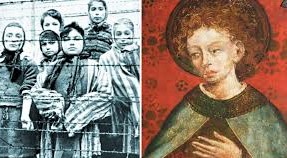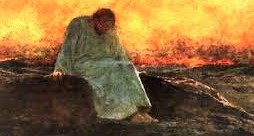
Unknown and Unsung Saints
Growing up Catholic, I used to read about the saints. That may sound quaint, and perhaps boring.
But it wasn’t their piety that attracted me. It was the fact that so many of them overcame huge obstacles and difficulties in their search for God. They were people of their time, stuck with its baggage just as we’re stuck with ours, but motivated by a spirituality that transcended it. They were determined to “do good” and stick to their principles no matter what.
To me, they were heroes, people to look up to and emulate. Today, their places are taken by sports figures, TV and movie stars, some of whom are hardly fountains of virtue. There may, in fact, be a cult of “badness,” but I believe most people still honor goodness.
Three saints who top my list of favorites for obvious reasons are the apostle Thomas; Thomas Aquinas and Thomas More.
The apostle, like me, was a skeptic and doubter, who eventually reconciled with Jesus and the other apostles. He’s mentioned only a few times in the gospels but in passages to which I relate easily.
Overcame Fierce Opposition
Aquinas, who lived in the 13th century, overcame fierce opposition from his wealthy family and others to become a great thinker and revolutionize the scholarship of his time. He contributed greatly to the way we think about God.
Thomas More, who lived in the 16th century, stood his ground against Henry VIII, king of England and one of the most powerful men in history. Like any good lawyer, More tried every legal means to avoid martyrdom but in the end literally lost his head for doing what he thought was right.
Some may think the age of saints has passed, but there’s never been a time when they were more needed, especially by people searching for God. And if we’re open to them, I believe we’ll see them all around us. Most true saints undoubtedly go unknown and they certainly aren’t all Catholics, Christians or even believers. Not all may be described as “holy,” but only God really knows who is, or isn’t, a candidate for that term.
A few well-known Catholics and Christians, such as Pope Francis, Mother Theresa, Dorothy Day, Dietrich Bonhoeffer and Franz Jaggerstatter, would be on my personal list of contemporary and near-contemporary saints, but following are a few others I believe deserve recognition – and emulation in some aspects of their lives. They may not be considered saints in the traditional sense. I present them here as an encouragement to those searching for God.
- Malala Yousafzai, 19, became an advocate for girls’ education as a child in Pakistan, which resulted in the Taliban issuing a death threat against her. On October 9, 2012, a gunman shot her when she was traveling home from school. She survived, and has continued to speak out on the importance of education. In 2014, she became the youngest person to receive the Nobel Peace Prize.
- Maya Angelou (1928 – 2014) was an American poet and civil rights activist. She published seven autobiographies, three books of essays, and several books of poetry, and was credited with a list of plays, movies, and television shows spanning over 50 years. She received dozens of awards and more than 50 honorary degrees. She is famous for her inspirational and motivational sayings, including: “Love recognizes no barriers. It jumps hurdles, leaps fences, penetrates walls to arrive at its destination full of hope.”
- Born and raised in a Hindu merchant caste family in India, Mohandas Karamchand Gandhi first employed nonviolent civil disobedience as an expatriate lawyer in South Africa in the Indian community’s struggle for civil rights. After his return to India in 1915, he set about organizing peasants, farmers, and urban laborers to protest against excessive land taxes and discrimination. He led nationwide campaigns for easing poverty, expanding women’s rights, building religious and ethnic amity, ending untouchability and achieving Swaraj or self-rule. Imprisoned for many years in both South Africa and India, he attempted to practice nonviolence and truth in all situations, and advocated that others do the same.
- Paul David Hewson (born 10 May 1960), known by his stage name Bono, is an Irish singer-songwriter, musician, venture capitalist, businessman, and philanthropist. He is best known as the lead vocalist of rock band U2. He is also widely known for fighting hunger and poverty in Africa. He was granted an honorary knighthood by Elizabeth II for “his services to the music industry and for his humanitarian work,” and has been made a commander of the French Order of Arts and Letters. Together with Bill and Melinda Gates, he was named Time Person of the Year in 2005.
- Henry Louis “Lou” or “Buster” Gehrig (1903 – 1941) from 1923 through 1939 played baseball 17 seasons for the New York Yankees. He was an All-Star seven consecutive times, a Triple Crown winner once, an American League Most Valuable Player twice, and a member of six World Series Champion teams. He had a career .340 batting average; hit 493 home runs and had 1,995 runs batted in. His career ended at age 36 when he was diagnosed with amyotrophic lateral sclerosis, and extremely cruel illness which in the U.S. is known as Lou Gehrig Disease because at the time it was still relatively unknown. He died two years later, but while still able, delivered what has been called “baseball’s Gettysburg Address” to a sold-out crowd at Yankee Stadium. “… Today I consider myself the luckiest man on the face of the earth. I have been in ballparks for 17 years and have never received anything but kindness and encouragement from you fans. …So I might have been given a bad break, but I’ve got an awful lot to live for.”




